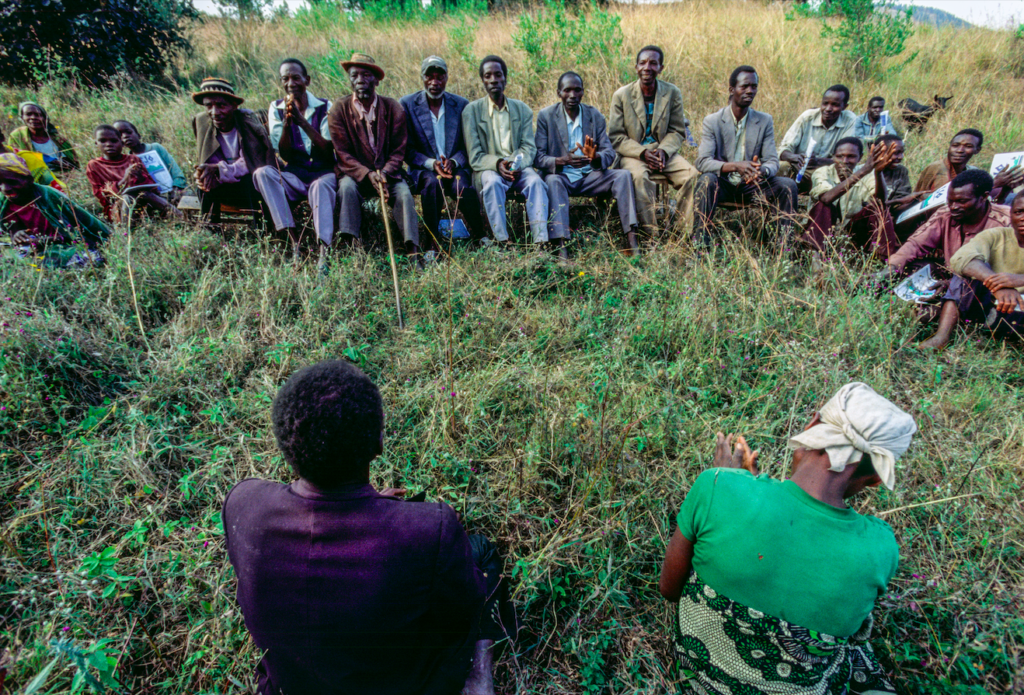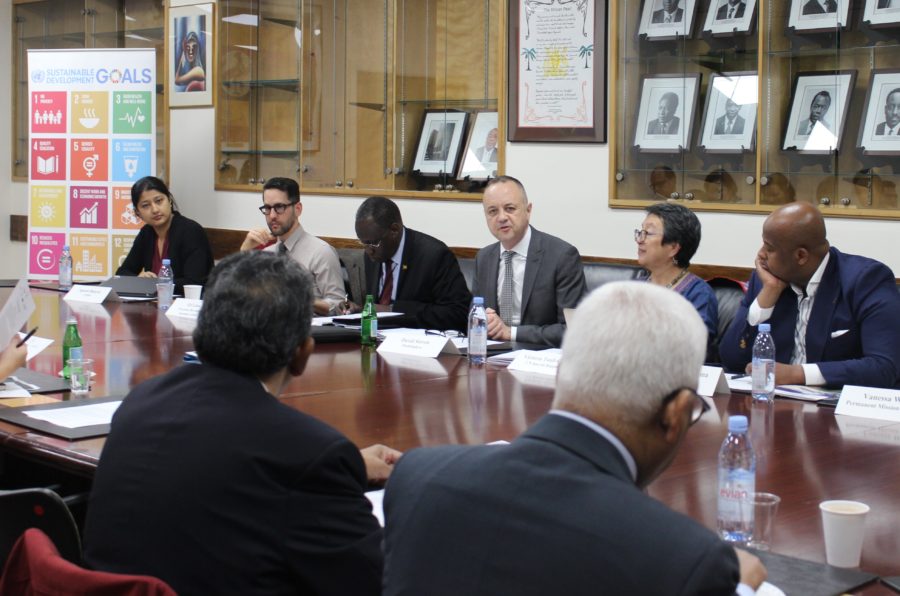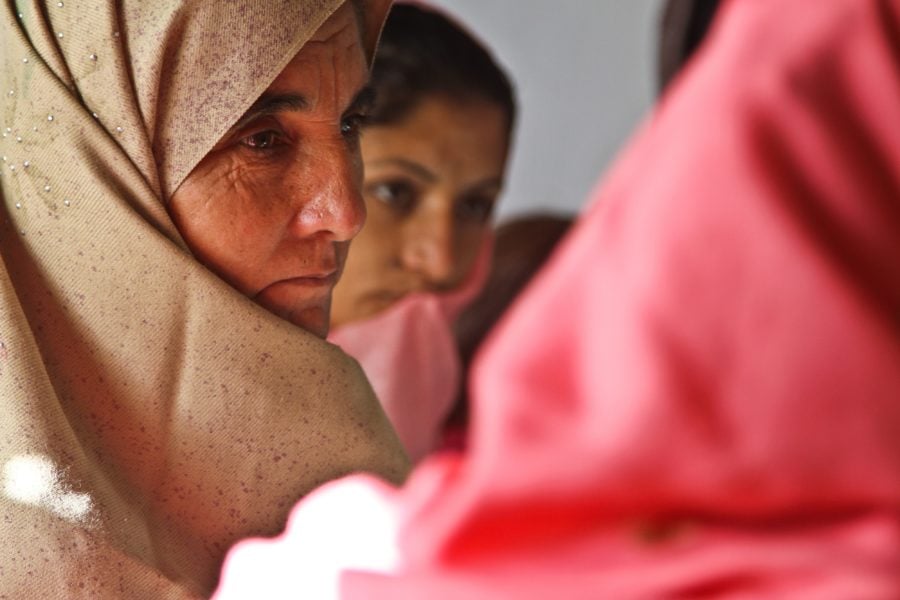Cordaid and the Overseas Development Institute (ODI) turned the spotlight on everyday justice providers, and their relevance to achieving justice for all in line with the Sustainable Development Goals (SDGs). At policy dialogues in London and New York City, Cordaid and ODI highlighted how the vast majority of justice providers resort to justice providers operating outside formal systems—and what kinds of support can improve the outcomes those justice seekers get.

Nearly 1.5 billion people have no way to solve legal disputes or find redress for crimes they have experienced. The brunt of this justice gap is borne by the very poorest and vulnerable groups, like women and girls. It is a significant driver of conflict and a brake on development.
In several countries, Cordaid and its partners work to strengthen access to justice, including through everyday providers spanning customary authorities, elders, faith-based or indigenous justice systems, community-based dispute resolution mechanisms, and others. Drawing on that rich experience, Cordaid and ODI published a new report offering concrete recommendations for policymakers and practitioners engaging with everyday justice providers.
Promoting policy dialogue on SDG16
At two events, Cordaid and ODI facilitated policy dialogue on the link between everyday justice providers and SDG16. SDG16 promotes peaceful, just and inclusive societies and includes a specific target on delivering justice for all by 2030. This year, the international community reviewed progress toward SDG16 and other goals at a High-Level Political Forum in July and an SDG Summit in September.
In London, ODI hosted a report launch that featured Masood Karokhail, head of Cordaid’s main partner in Afghanistan, SALAH Consortium. In New York, Canada and Uganda co-hosted a public roundtable with Cordaid, ODI, and the International Development Law Organization (IDLO), moderated by David Steven from the Task Force on Justice. Both events drew attention to the fundamental role played by everyday justice providers in the lives of many people around the world.
“States should recognise the dynamic character of indigenous customary law and the ability of indigenous justice systems, like other justice systems, to adapt to contemporary situations and evolve.”
At the New York dialogue, speakers emphasized there can be no meaningful effort to close the justice gap that does not grapple with the prevalence of everyday justice providers. Uganda’s Ambassador Philip Ochen Odida noted that everyday justice providers are the first resort of poor, rural and remote communities. “To leave no one behind, it’s essential that we make sure the justice needs of the poor and marginalized, and especially women, are attended to.” Victoria Tauli-Corpuz, the UN Special Rapporteur on the rights of indigenous peoples, emphasized that indigenous peoples’ own justice systems are essential to ensuring their autonomy and survival.

Diverse pathways to 2030
Efforts to accelerate progress on SDG16 risk overlooking the diverse ways in which the majority of people resolve disputes and seek redress, especially in fragile and conflict-affected contexts. The report by Cordaid and ODI adds to voices, such as those in recent reports from IDLO, that call for deliberate engagement with everyday justice providers.
This is not to suggest that everyday justice providers are unproblematic. All justice providers–in statutory legal systems, or more broadly–are steeped in prevailing political, social and economic dynamics, and incorporate inequalities and biases. Customary justice systems tend to be patriarchal in nature, with harmful effects on women’s access to justice. Yet a key insight of the Cordaid-ODI report is that everyday justice providers present no lesser and no greater a challenge on issues like rights observance and accountability than the formal courts, judges, and lawyers on which international rule of law aid typically focuses.

The report aims to shift SDG 16.3 debates toward innovative, evidence-based recognition of more diverse pathways to justice, focusing on the mechanisms and processes people are already using. It sets out:
- methods for bringing everyday justice providers to light, for instance through needs-focused assessments, to inform planning of rule of law support;
- entry points to engage with everyday justice providers, ranging from support for justice seekers to know their rights and the law, to improving interface and coherence between justice providers;
- reducing rights-abrogating practices that harm women, children, and other groups, through community dialogue of training of everyday justice providers;
- what it takes for international actors, like donors, to work with everyday justice providers, such as clarity of objectives and acceptance of risk.
“The question is not one of either/or. Given a choice, people will shop for the best justice system to meet their needs. We need to focus on bridging systems in ways that deliver better access to justice.”
Insights drawn from practical innovation
Cordaid’s work at country level informs the report. Cordaid has been an innovator in engaging constructively with everyday justice providers, including:
- In Afghanistan, where Cordaid and SALAH Consortium organizes exchanges programmes where religious leaders or tribal elders are brought to state courts to interact with judges in the formal system and observe how cases are dealt with; this interaction helps to clarify jurisdictional boundaries, improve communication, and secure commitments from informal justice practitioners to refer criminal courses to state courts, in line with the law
- In South Sudan, where Cordaid and South Sudan Law Society train volunteer paralegals (often young people with some legal training) to sit within the customary courts adjudicated by local chiefs to advise on compliance with the law and human rights norms; while the chiefs are experts in local customs, paralegals have become valued resource to the chiefs in informing them about the changing content of South Sudan’s laws
Globally, Cordaid and its partners are committed to expanding access to justice, especially for the most vulnerable groups in society, in ways that enable people to get the best results from the pathways to justice they trust most. As a justice partner of the Task Force on Justice, Cordaid continues to work with a broad spectrum of allies and stakeholders to achieve the goal of justice for all by 2030.
Please see Cordaid and ODI’s new report, Diverse Pathways to Justice for All. Or visit our Access to justice web page.